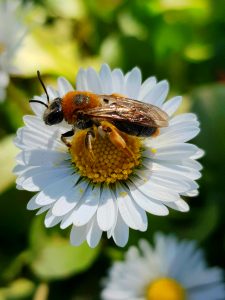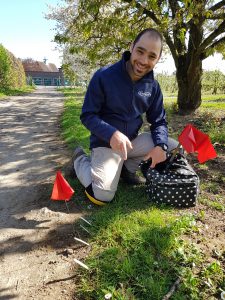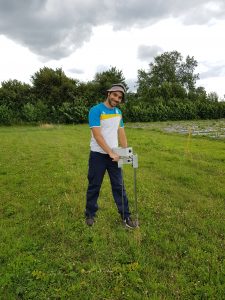Bees and other pollinators are facing many challenges such as climate change, pests and diseases, habitat loss and misuse of pesticides. We can all help safeguard pollinators by ensuring our gardening and farming practises are pollinator friendly. Here Konstantinos Tsiolis tells us how his research can help us better understand bees needs.

There are more than 20,000 known bee species worldwide and they vary significantly in their size, habits and appearance having adapted according to the plants they like to visit. More than 85% of existing bee species are not social, like honeybees, but solitary. And research here at the University of Reading shows that the value solitary bees contribute to UK apple pollination can be costed at around £51 million.
Why are bees so important?
Insect pollination is an essential part of a functioning ecosystem, but it also contributes greatly to agricultural productivity. Animal pollination including insects such as bees, birds and small mammals supports more than 75% of the 115 leading crop species globally which depend on or benefit from it and its annual market value has been estimated at £180-442 billion worldwide. Bees are the champions of pollinators, contributing to the production of one third of food consumed by humans. Both managed and wild pollinators are not only highly beneficial to society by contributing towards the maintenance of biodiversity, ecosystem stability and food security but they also play significant role towards farmer and beekeeper livelihoods, social and cultural values.
Keeping solitary bees safe
Solitary bee females mate independently, create their own nests containing about ten brood cells (depending on species), provide enough food for each offspring (pollen and nectar), lay an egg in each cell and finally die before the next generation emerges. Most known bee species are ground nesters.
We know how to improve floral resources for bees, but methods to protect areas for ground-nesting bees are poorly understood. Solitary bees need both flowers for food and a place to live such as bare ground to nest in. And as studies show just how effective several ground-nesting bee species are as crop pollinators means we need to focus more on understanding their nesting needs and provide the appropriate nesting resources.

What makes a good nesting habitat?
My research project is identifying the key parameters for solitary bee nesting as a basis to develop practical ways to enhance nesting resources for ground-nesting bees in commercial orchards. I am currently focusing on understanding the nesting needs of the main apple pollinators Andrena nitida, Andrena haemorrhoa and Andrena dorsata.
In the UK, ground nesting bees are the most economically important pollinators of apple crops. However, very little is known about where they nest in orchard landscapes and what their specific habitat preferences are. My research will provide novel insights into the habitat preferences of ground nesting Andrenid bees and show how simple management interventions can be used enhance populations of this important pollinator. The findings of this project will underpin more general implications for the sustainable management of largely overlooked pollinating taxa which have a central role in food security.
How can we protect pollinators?
Bees and other pollinators are facing many challenges such are climate change, pest and diseases, habitat loss and misuse of pesticides. We can all help safeguard pollinators by ensuring that our gardening and farming practises are benefiting them as much as possible and are limiting harm to the minimum.
Furthermore, increasing awareness of the importance of bees and other pollinators via available platforms and outreach events is particularly important towards their safeguarding. Someone could say that the younger generations are getting more and more disconnected from nature and agriculture. I strongly believe that a vital component of an ecologically friendly future is educating and inspiring the younger generations in the importance of protecting our pollinators and biodiversity in general.
You can help pollinators if you:
- Grow more flowers, shrubs and trees
- Let your garden grow wild
- Cut your grass less often
- Don’t disturb insect nest and hibernation spots
- Think carefully about whether to use pesticides
Konstantinos works in the School of Agriculture, Policy and Development as a part of the Reading Bee Team. Visit the website and find out how research is helping to bust myths about pollinators.
Konstantinos is also co-supervised by staff at NIAB EMR and Worldwide Fruit Ltd.

